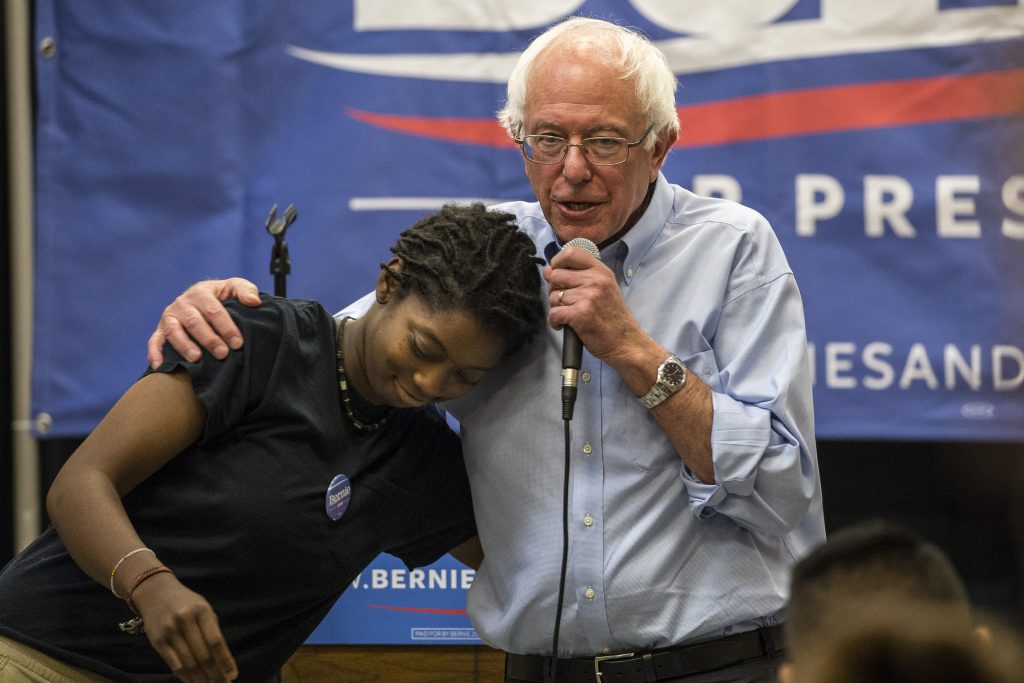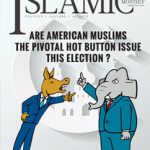The Bernie Sanders campaign came to a de facto halt after his loss in California. However, the Sanders movement rolled forward – finding considerable ideological, rhetorical and personnel imprints on the Democratic National Convention — which was held in Philadelphia, Pennsylvania on July 25 through July 28. Sanders finally endorsed Hillary Clinton, his campaign adversary, at the convention.
The end of Sanders’ presidential campaign extends bleak options for Muslim American voters. On the right hand is the unthinkable — Republican nominee Donald Trump, who built his entire platform on bigotry and xenophobia, of which Islamophobia registers heavily. On the left is Hillary Clinton, a known political commodity who has never been gun shy with military aggression in the Middle East, and domestically, a staunch proponent of surveillance and counter-radicalization programming.
Betwixt between these options, most Muslim Americans are not looking forward to the presidential election in November. In the process, this circumstance extends an opportunity to gaze backward at a now halted presidential campaign that not only offered hope for millions of Muslim Americans at this critical impasse, but also fully integrated them into the process of presidential politics.
Sanders was never a Muslim American savior. But many accounts illustrated him as such, bending uncomfortably too close to reverence and undeserved praise. Deification of politicians is all too common, particularly during moments of sociopolitical crisis. Sanders’ appeal was his embodiment of the blue-collar everyman — a politician, who humanized every segment of the American polity, and in the process, humanized himself.
During an impasse — when Republican candidates based their campaigns on demonizing Islam and vilifying Muslim Americans, and Democratic leaders reconstructed good-versus-bad Muslim binaries — Sanders offered a trenchant intervention: seeing Muslims as everyday and average Americans and, going one step further, immersing himself in their communities and fully engaging them in his campaign.
If forced to look forward, and most importantly, beyond Super Tuesday 2016, the degree of Muslim American engagement in the Sanders campaign offers a foundation to build off of and a new standard of expectations from future presidential hopefuls. Photo opportunities, token seats at the table and proclaiming that “Islam is peace” and “Muslims are Americans” are not enough. Bernie, in part, helped shatter that green ceiling.
Muslims for Bernie
Muslim American support for Bernie, like the remainder of his following, was visible and vocal. Leading up to the primaries and caucuses, prominent Muslim American activists and civil rights leaders endorsed the Vermont senator. In addition, scholars and public commentators penned a range of well-circulated opinion pieces seeking to convince Muslim American voters why Bernie was their best option. One notable piece by Donna Auston and Zareena Grewal, aptly titled, “Why Muslim Americans should vote for Bernie Sanders,” held that:
Sanders has consistently condemned the bigoted, anti-Muslim rhetoric that has become a staple of this presidential campaign season. Black and brown Muslims know only too well how Islamophobia compounds other forms of prejudice and discrimination — especially in the areas of racial and religious profiling by law enforcement, and protection from bias incidents and hate crimes.
In addition to his explicit condemnation of an Islamophobia that Donald Trump capitalized on at every turn and that Hillary Clinton latently wielded to resonate with middle and right-leaning voters, Sanders’ economic vision addressed the concerns of poor and working-class Americans, and his non-interventionist foreign policy offered a clear break from the warmongering of his intra- and inter-party competitors.
Sanders was a grassroots candidate who resonated strongly with the grassroots Muslim American element and offered a presidential alternative to the Republican and Democratic establishment commodities in the race. His political vision was as radical as his rhetoric, and both resonated deeply with Muslim Americans in poverty or near poverty, demoralized by perpetual war and warmongering in their ancestral homelands, made vulnerable by state-sponsored and private Islamophobia, and marred by structural racism.
Sanders spoke more like a grassroots activist than a politician. But his bellowing Brooklyn tenor was backed by a track record of service, community leadership and principled politics, which netted him early upset victories in Colorado, Minnesota, Oklahoma and Kansas, and galvanized a swelling following that comprised an unprecedented grassroots campaign.
Muslim Americans were indeed part of the fold early on, but Michigan ushered in a new degree of visibility and leadership.

Bernie campaigning in Iowa >Flickr/Phil Roeder
Making history in Michigan
While California boasts the largest number of Muslim Americans in the United States, Michigan holds special symbolic and historical significance in Muslim American lore and influence. The Wolverine State is home to Dearborn, which is perceived discursively and even academically as the quintessential Muslim American enclave. The state is also home to Hamtramck, the first (official) Muslim-majority city in the country, and is the soil that birthed the Nation of Islam, Malcolm X and a thriving African American Muslim population.
In popular and political parlance, Muslims and Michigan go hand-in-hand. While Trump and even Clinton were keen on making this association within the realm of terrorism and national security, Sanders connected the association to campaign possibilities, namely, campaigning within the very communities other politicians only mentioned after a terror attack or while advocating on behalf of surveillance or “neighborhood policing” programming.
For two days, Sanders made his rounds in the predominantly Arab and Muslim American enclave of East Dearborn. Support for Sanders in Dearborn, before he stepped foot in it, was already strong, and he tailored his campaign efforts to maximize support within this overlooked community:
The sight of young women in headscarves donning Bernie Sanders shirts and the sound of community elders affectionately mangling the Vermont Senator’s name seemed ubiquitous on and before election day. Anybody who stepped inside of Dearborn during the last several months, particularly the city’s Arab heavy east and south sides, knew that it was Bernie country.
Sanders and his campaign knew it. He issued Arabic print and radio ads leading up to the Michigan primary. He then met with community leaders and youth, and addressed the Arab American community in the heart of the community. Through several mediums, and finally on the ground, Sanders tailored his message to Arab and Muslim Americans. Intimately, genuinely, and directly. Which superseded the religious identity of the messenger and his audience.
Against the highest odds and the predictions of professional forecasters (most notably Nate Silver), Sanders defeated Clinton in Michigan. The stunning victory on March 8 was dubbed one of the greatest upsets in modern presidential campaign politics, followed by headlines crediting Muslim American voters with helping Sanders steal Michigan from Clinton.
After Michigan, the Sanders campaign was recharged by a surge in momentum that pushed him toward more upsets, and more primary and caucus wins. In addition, the value of Muslim American political organizing and influence was evident for all to see, expanding inroads for enhanced Muslim American participation and leadership in the Sanders campaign.
Not tokens, but real leadership
The highlight of the Sanders campaign may very well be his April 13 rally in New York City’s Washington Square Park. Nearly 30,000 followers filed around the stage and sat in front of the Washington Square Park Arch, hearing from a number of Sanders’ supporters and surrogates before the nominee himself took the stage. Among them was Linda Sarsour, a hard-nosed, head-scarved Brooklynite who joined the Sanders campaign as a surrogate.
“What up New York City?!?!” she opened, delivering a moving speech that resonated deeply with attendees and those who watched from afar. However, apart from her words, her image spoke volumes, particularly to Muslim Americans. Sarsour isn’t merely a Muslim American woman. She is a fierce proponent of Palestinian self-determination and human rights, a civil rights organizer who is as keen to march with Black Lives Matters activists as she is alongside Arab or Muslim protesters, and a leader whose radical politics cast her as a menace or pariah by establishment politicians.
For Sanders, however, she was an ally. And an ally he delivered to key races beyond New York and regularly deployed as a visible figure in his campaign. Sarsour, however, was not alone within the formal (and informal) ranks of Sanders’ Muslim American surrogates and supporters. House Representative (Minnesota) and Muslim American Keith Ellison was the second congressman to endorse Sanders, and Ahmed Bedier, Amer Zahr, Tarek El-Messidi, Rusha Latif, and Al-Sharif Nassif coordinated Sanders’ campaign efforts with Muslim American voters, while an endless list of others assisted with get-out-the-vote, canvassing and voter-registration efforts to push the Bernie campaign forward in Muslim American communities.
Muslim Americans were not passive actors or bystanders in the Sanders campaign, but an integral part of it. They helped shape messaging, delivered speeches at key rallies and events, coordinated community programming, and served as delegates at the Democratic National Convention.
While Clinton also had a strong Muslim American following, her supporters seldom rose from the shadows. Muslim Americans for Sanders, however, were boisterous, visible, organizing on the ground and on social media, and fully invested in a presidential campaign that treated them as political partners instead of political pariahs.
Campaigning Ahead
Apart from influencing the Democratic National Convention platform with a committee that includes Ellison, James Zogby and Cornel West, the Sanders bid for the White House has met its wall. Clinton — with a 2,220 to 1,879 edge in pledged delegates (as of July 3), made wider by the resounding 591 to 48 lead in super-delegates — will be the candidate the Democratic Party will field to defeat Trump.
Sanders finally endorsed Clinton at the DNC in Philadelphia. Which for his legions of Muslim American supporters, brings both disappointment and an opportunity to look forward. And before looking forward, counting and memorializing the many strides made within the progressive Muslim American space. Mirroring the Sanders campaign, progressive Muslim Americans have mainstreamed an uncompromised message — condemning domestic and foreign policies that targeted Muslim bodies and communities, unapologetically demystifying and dismantling Islamophobia, and unveiling that Muslim American interests were also linked to the economy, employment and education, not merely just foreign affairs.
Indeed, this evolving progressive Muslim American bloc was far more than merely vocal on social media or op-eds, they were also showcased, front and center, in the Sanders campaign. From donning “Inshallah Bernie” T-shirts on Detroit’s Warren Avenue to speaking to thousands at official campaign rallies to being featured on mainstream news stations like Fox or CNN advocating on behalf of Sanders, Muslim Americans were prominent partners of his campaign.
This degree of enfranchisement sets a new standard for future politicians to meet, or surpass, if they are keen on earning the Muslim American vote. And more importantly, it offers an unprecedented measure of hope for the Muslim American leadership that has or is on the cusp of developing, who will unapologetically and unabashedly raise our concerns and fight for our interests in future campaigns — both national and local.
Sanders was and is no savior. But he is what he always said he was — a catalyst for a movement far bigger than him or any other candidate. He met that promise and exceeded expectations by inciting and inspiring, spurring hope and integrating marginalized voices — particularly progressive Muslim Americans, who are more than willing to carry his baton and move forward.
This article appears in the Summer/Fall 2016 print issue of The Islamic Monthly.
The magazine can now be purchased with print on demand! Click on this link to purchase a single issue.






